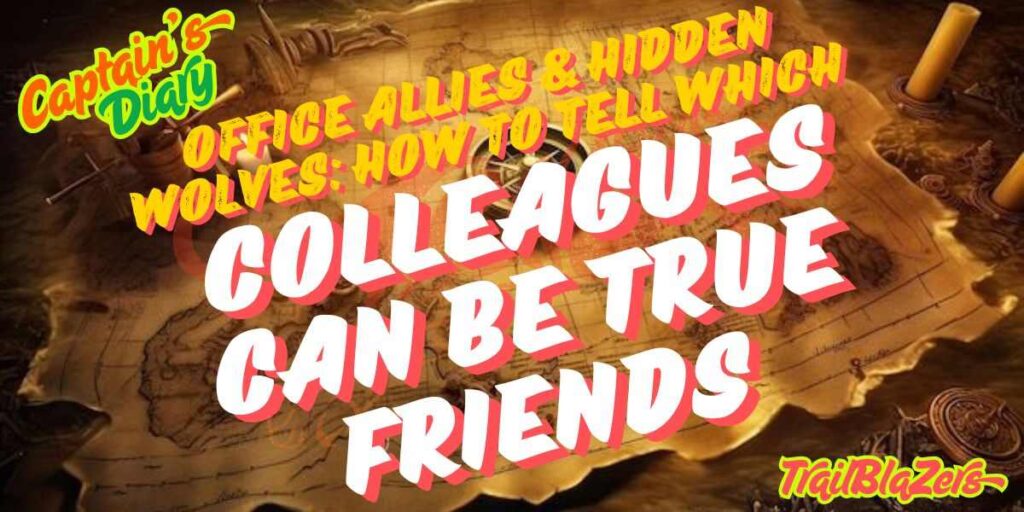Office Allies & Hidden Wolves: How to Tell Which Colleagues Can Be True Friends.
Office Allies or Mamak Mates: How to Spot a Friend Between Coffee Breaks and Gossip.

Intro:
Real friendships at work can boost job satisfaction, performance, and mental well-being by providing trust, emotional support, and a sense of belonging. Yet not every friendly face in the office is a friend: toxic coworkers—those who gossip, manipulate, or constantly complain—can sap morale and increase stress.
Drawing on psychological research and expert insights, this guide shows you clear, humour-tinged methods to spot genuine allies in the breakroom and avoid hidden wolves in sheep’s clothing.
You’ll learn actionable tips—grounded in trust theory, boundary-setting, and real-world examples—to cultivate healthy bonds and steer clear of draining friendships.
Whether you’re sipping kopi tarik at the mamak stall or leading a virtual meeting, you’ll know exactly who to invite on weekend hikes and who to politely wave goodbye to in the elevator.
Step 1: The Office Jungle: Where Friendships Go to Either Thrive or Get Eaten by the Printer.
In Malaysia, the line between colleague and kawan is as blurry as the Nasi Lemak stain on your Monday morning report. You share teh tarik breaks, complain about the boss in hushed mamak whispers, and borrow staplers like they’re family heirlooms.
But when the clock hits 5 PM, who sticks around? Who asks about your kid’s school play versus who just asks for your TPS report?
Friendship at work isn’t about matching baju kurung colors. It’s about knowing who’ll help you hide a body (metaphorically, lah) and who’ll sell you out for a promotion. Let’s break it down—no MBA required.
Step 2: The Psychology of Work Buddies: Why Your Brain Cares
According to Dr. Robin Dunbar, the anthropologist who gave us “Dunbar’s Number” (the 150 people your brain can handle), workplace friendships survive on two things: proximity and vulnerability.
Proximity: You sit next to someone for 8 hours a day. Eventually, their kopi-O kosong habits become your emotional support.
Vulnerability: Sharing that you cried during Upin & Ipin reruns = friendship green light.
But psychologist Adam Grant warns: “Work friends are like durian—sweet but risky. One wrong move, and the smell lingers.”
Step 3: Signs Your Colleague Might Be a Ride-or-Die Kawan
1. They Laugh at Your Jokes (Even the Bad Ones)
If they chuckle at your “Why did the Excel sheet cross the road?” punchline, they’re either a saint or plotting something. Saints exist. Sometimes.
2. They Remember Your Cat’s Birthday
Or your mom’s surgery date. Or your irrational hatred for pineapple on pizza. Details matter. Psychologists call this “attunement”—fancy talk for “I see you, lah.”
3. They Share Their Kuih Unprompted
In Malaysian culture, food = love. If they slide you a karipap with a “Jom, makan” and no ulterior motive, keep them. They’re gold.
4. They Stick Around After 5 PM (Without Overtime Pay)
Work friends vanish like teh tarik steam at clock-out. Real friends stay to hear about your dating app disasters.
5. They Roast You Gently
“Bro, your presentation slides look like a rojak accident.” Light teasing = trust. Brutal mocking = HR complaint.

Step 4: Red Flags: When Colleagues Are as Fake as a “Healthy” Roti Canai
1. They Only Talk to You When They Need Something
Like your WiFi password, your carpool, or your signature on their leave form. Psychologists call this “transactional reciprocity”. You call it “habis guna, lupa lah.”
2. Their Compliments Feel Like AI-Generated
“Your report was… adequate.” Vs. “You crushed that presentation like sambal on rice!” Forced praise = emotional spam.
3. They’re the Office CCTVs
If they know who took the last kuih, who’s dating HR, and who forgot to refill the printer paper—dia ni cari pasal.
4. They Ghost You Outside the Office
You invite them to mamak? “Sorry, lah—busy.” But their Instagram shows them clubbing in TRX. Classic “compartmentalizer”—you’re a work tool, not a friend.
5. They Steal Your Ideas Like Free Parking
“Great idea! Let me just… present it to the boss.” Psychopaths lack empathy. Opportunists lack shame.
Step 5: The Expert Playbook: How to Test the Waters Without Drowning
1. The Mamak Test
Invite them for teh tarik after work. If they say yes, you’re in. If they say “Next time lah” for the 7th time, they’re as loyal as a parking ticket.
2. The Vulnerability Gambit
Share a mildly embarrassing story (“I wore slippers to Zoom meeting lah”). If they reciprocate, friendship potential: high. If they screenshot it, run.
3. The Raya Invitation
Offer leftover kuih raya. If they take one and ask about your family, green flag. If they take the whole container, red flag (and a future musuh).
Step 6: Real-Life Stories (Because Malaysians Love Cerita)
Story 1: The Kopi Keeper
Alicia’s colleague brought her kopi peng every Monday after noticing she missed breakfast. Two years later, they co-own a cupcake side hustle.
Story 2: The Snake in Batik Clothing
Amir lent his “friend” his car for a “family emergency”. The car returned with a speeding ticket and an empty tank. The friend? Promoted to Amir’s boss.

Step 7: Final Word: Keep Your Friends Close, and Your Colleagues Closer (But Not Too Close)
Work friendships are like cendol—sweet, refreshing, but best enjoyed before it melts. Trust takes time. So does spotting a kepoh disguised as a kawan.
“Never confuse shared spreadsheets with shared souls. But always share the kuih.”
